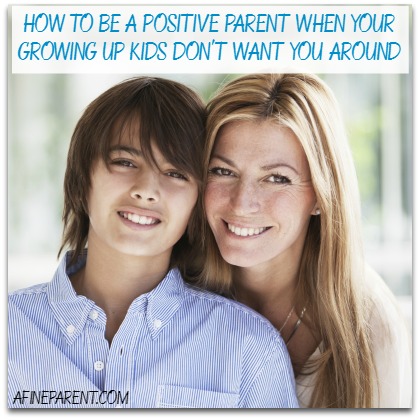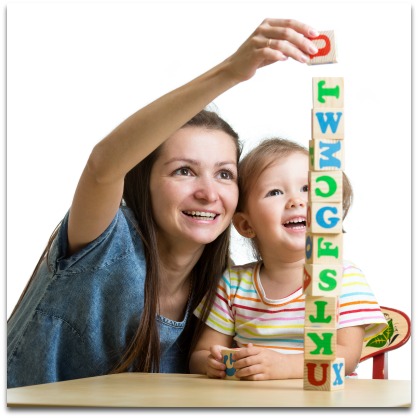 Recently, my 12-year-old was showing me a school project about his future, including going to college across the country.
Recently, my 12-year-old was showing me a school project about his future, including going to college across the country.
The idea of him going away to college wasn’t a fun one, but as cheerfully as I could muster, I said, “I can’t wait to visit you there.”
He blurted back, “You’re not invited!”
He quickly added, “Just joking!” but I got the message.
This little guy—who used to greet me so enthusiastically that onlookers thought we’d been separated for days, not hours—was telling me that he’s not so little anymore.
Our children start out as helpless infants who almost feel like an extension of our own bodies. Someday—in the not-too-distant future—they will be self-sufficient adults, possibly living across the country. It is their job to get there, and our job to support them as they grow, mature, and separate from us. Toddlers want to “Do it myself!” as they strive for independence. Your 8-year-old might like snuggles at home but don’t be surprised when she suddenly drops your hand on the way to the bus. “Someone might see us!” (Yup, it happened to me recently.)
Your child really starts in earnest on the road to independence in the tween/teen years. These can be some of the hardest you face as a parent. Kids this age can seem like children one minute and wise beyond their years the next. They take 2 steps away and one step back.
Not only is your child experiencing the physical upheaval of puberty or pre-puberty, his brain is rewiring and this can be a source of emotional upheaval.
Amid all of this, your child is doing his job and separating from you. You both will experience growing pains.
As a parenting coach and the mama of a teenager, a tween, and a pre-tween, I know how hard these years can be. You are not alone: a recent article stated that “The years surrounding the onset of adolescence are among the most difficult times for mothers. Compared to mothers of infants, these women experience the lowest levels of maternal happiness and are even more stressed than new parents.” It’s hard to move out of the center of your child’s life—let alone be excluded from the circle.
The whole point of parenting is to raise children into adults who no longer need you. That doesn’t mean it’s easy.
Sentences from my two oldest often start with “No offense, Mom…” I often get karate blocked when I go in for a hug. I’m no longer the first to know how they’re feeling or what they’re thinking.
But I also know certain tweens and teens (ahem) who still ask for tuck-ins and like me to walk them to the door in the morning to say good-bye, who seek me out to pour out their ideas and their hearts when they are in the mood.
How do we stay close to our kids when they are (developmentally appropriately) beginning to move away from us?
We need to parent for both connection AND independence. We have to hold on so they can let go.
Here are some strategies you can use and ideas to keep in mind as your growing child transitions from your little one to an adolescent and eventually, to an adult.
#1 Don’t take it personally
 Or tell yourself what one of my best friends used as a mantra: “It’s not about me!”
Or tell yourself what one of my best friends used as a mantra: “It’s not about me!”
Growing kids’ surly moods and dramas are very similar to the outbursts of an overtired toddler. You may be on the receiving end, but you’re not responsible for their emotional reactions.
Of course, once the drama has passed, you will have a conversation about how we talk to each other in a family. But if your child is in the midst of a meltdown, or slams down his backpack, or speaks sharply to you- react with empathy and don’t make it about you.
As you did with your child when she was younger, ask yourself what is driving the behavior? Make an empathic and loving observation: “Hey sweetie, looks like you’re having a bad day. I’m here if you need anything.”
#2 Be a ‘potted plant’
Be around even if you don’t think your child cares if you’re there or not. Your simple presence is more important than you know.
From a recent article in the NY Times: “The studies of parental presence indicate that sheer proximity confers a benefit over and above feelings of closeness or connectedness between parent and child.”
Your child still needs to know you’re there even if she is ignoring you.
#3 Remember your own “growing up” years
Do you remember how awkward you felt? Like everything you did or said was wrong? Do you remember the absolute scrutiny (real or imagined!) of your peers?
It is such a hard time!
A trip back to your own “growing up” years will make it easier to understand what your child is going through and help you meet him with empathy.
#4 Give your child as much independence as possible – but be prepared to be a safety net
 Your child is in the beginning of the transition to adolescence and eventually, adulthood. Do a little soul-searching.
Your child is in the beginning of the transition to adolescence and eventually, adulthood. Do a little soul-searching.
How can you give your child more independence? Can she walk to the store for you? Walk to school or take public transit on her own? Can she stay home alone? Can she babysit? What real decisions can you give her over her life?
Your child needs to be able to make decisions and learn from them while you are still there to help pick up the pieces if need be.
#5 Practice ‘sideways listening’
Give your child the opportunity to talk to you by being unobtrusively next to your child.
Driving, walking, and doing chores together are all low-pressure situations in which kids will feel more comfortable initiating a conversation. You are literally ‘not in her face’ and they feel more relaxed.
#6 Take advantage of every opportunity to connect with your growing child
Your child is not saying, “Play with me Mommy!” but connection and attention are just as important now as they ever were. When your child wants to talk or show you something or tell you about a favorite movie, relish the moment.
Kids often like to choose inopportune times to talk to us about important stuff. I’ve learned the hard way to turn away from what I’m doing when they want to talk. Earlier, “Hey, sweetie, I have a minute. Do you want to tell me about that thing, xyz?” would get a surly “No, never mind.” Now, I’ve learned to relish the opportunity to connect whenever they bring things up or want to show me something, even if isn’t quite the perfect timing for me.
#7 Try to ignore the attitude!
 What is underneath the protective armor?
What is underneath the protective armor?
If your daughter rolls her eyes at you, it could be because she’s feeling like you don’t understand. Rather than “Don’t roll your eyes at me!” try this: “It looks like from your reaction that you think I don’t understand. I probably don’t but I’m trying! Can you explain it to me?”
If your son is storming around snapping at people about where his school work or school supplies are, he could be feeling anxious about the new and more serious pressures of school. Try saying, “Hey kiddo, looks like you’re feeling worried about school. Need a hand finding your stuff?”
 Does your adolescent’s attitude drive you crazy at times? You are not alone! We partnered with Dr. Daniel J. Siegel, clinical psychiatrist and best-selling author, in the Parenting Adolescents Masterclass, to better understand how the teenage brain is developing, how to avoid power struggles and what we can do to empower our child to thrive. This packed masterclass is one of the 70+ masterclasses you get when you join the AFineParent Academy today. Click here to learn more.
Does your adolescent’s attitude drive you crazy at times? You are not alone! We partnered with Dr. Daniel J. Siegel, clinical psychiatrist and best-selling author, in the Parenting Adolescents Masterclass, to better understand how the teenage brain is developing, how to avoid power struggles and what we can do to empower our child to thrive. This packed masterclass is one of the 70+ masterclasses you get when you join the AFineParent Academy today. Click here to learn more.#8 Recognize that your child is doing the best she can
Try to see your child in a positive light.
Even though it might seem like it sometimes, she’s not trying to be difficult- she’s going through a difficult time.
Assuming positive intent, “she’s doing the best she can” transforms your approach and shifts your attitude and the dynamic between you. A shift in your attitude can increase your empathy and connection with your child and makes her much more agreeable.
#9 Have 5 positive interactions for every negative one
Relationship expert John Gottman says that “The magic ratio is 5:1. In other words, as long as there are five times as many positive interactions between partners [or parent and child] as there are negative, the relationship is likely to be stable.”
I know that so often we get caught up in moving through the to-do list and the schedule. Homework, lessons, practices and all our responsibilities can bring out the tendency to nag.
“Do you have homework? Can you put away the laundry? Let’s go or we’ll be late…” Don’t forget to give a compliment, make a joke, try for a hug. (We all need 12 Hugs A Day!)
Parenting in general requires a lot of patience and a big heart, but this is particularly true in those “growing up” moments when your child intentionally, or unintentionally, is trying to pull away.
You’ve got to hold on—by being there and not taking it personally—so they can do the sometimes messy job of letting go without added guilt.
This is ‘the beginning of the leaving’ when our children will be self-sufficient, happy, healthy adults. Navigate this period in a way that grows your connection and love for each other and sets the stage for a new relationship as your little ones grow into adults.
The 2-Minute Action Plan for Fine Parents
Take a few minutes to connect in your heart and your head with your child. Reflect on the following questions and spend a few minutes growing that energy. This can be a place you come back to when things feel hard.
- What are your kids’ strengths? What makes you laugh about them? What do you love about them?
- Relive a happy moment from when your kids was little. What are some funny things they said or did? What did they smell like, look like, feel like in your arms?
- Think of what you want for their future. Imagine they are away from you and living their lives. What will help them live independent, content, happy lives?
The Ongoing Action Plan for Fine Parents
Some of the suggestions above might be some major shifts to your parenting. Don’t try to do everything all at once. I’ve suggested shifts in your language, your attitude, and your availability to your child. For the next week- decide in which area you’d like to improve and tackle it.
Change your language? Make some notes to remind yourself. Hang a post-it by the sink that says “5:1” to remind yourself of the magic relationship ratio.
Change your attitude? Give yourself a mantra. Every time you feel yourself getting annoyed by your kids’ words, attitude, or actions, repeat your mantra to yourself. It could be one of the tips above – “She’s doing the best she can,” “It’s not about me!” – or something that reminds you of the parent you want to be, such as “Choose love.”
Be more available? Change your schedule to be home when your kids are. Hang around while they’re doing homework. Put aside your work when they wants to show you a video or tell you something.
Reflect on the changes you’re noticing. Enjoy your kids, even as they slowly let go and become the adults you can be proud of!


What could be the reason of a 5 years old pulling away from you like this?
This is such an insightful article! I really appreciate the focus on fostering independence and resilience in kids while maintaining a supportive environment. The practical tips shared here make it so much easier to navigate the challenges of parenting. Thanks for sharing these valuable insights!
My mom has been thinking I’m throwing her attitude and has threatened to kick me out multiple times. I need help
Brittany- That must be so painful. What do you need? Have you tried writing a letter to your mom? Maybe you could give her this? http://gretchenschmelzer.com/blog-1/2016/7/4/parents-corner-the-letter-your-teenager-cant-write-you
Excellent! Love it. Yes, people seem to be upset that their teens don’t act like sweet little kids anymore, but then also expect them to be totally independent like adults. Just chill and let them be who they are, they are learning to be independent, but it takes time. It doesn’t last forever, they will eventually grow it.